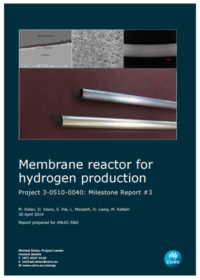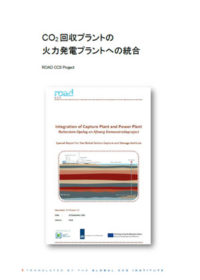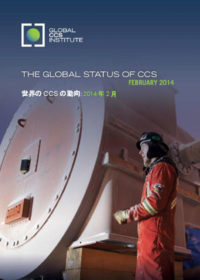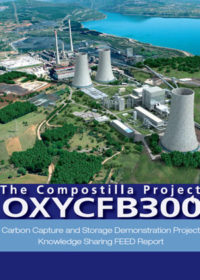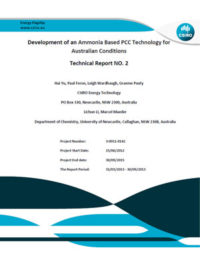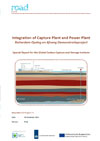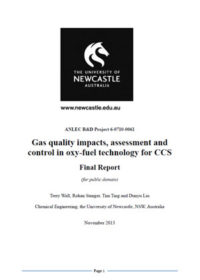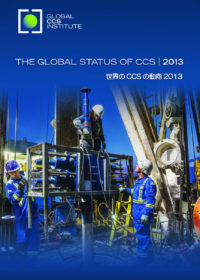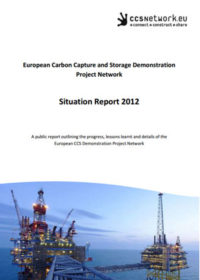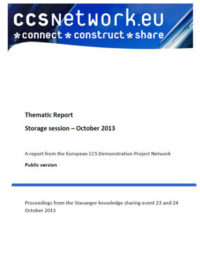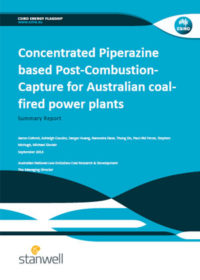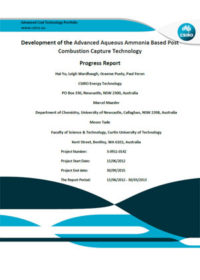Resources
Publications
Our publications, reports and research library hosts over 500 specialist reports and research papers on all topics associated with CCS.
View our Publication Library Disclaimer.
Filter by
Membrane reactor for hydrogen production
30th April 2014
Topic(s): Carbon capture use and storage (CCUS), CO2 capture
This project aims to develop a catalytic membrane reactor (CMR), which intensifies hydrogen production processes and could lead to near-complete hydrogen conversion, purification and pre-combustion CO2 capture in a single device.
During this reporting period, a membrane module with a surface area of 500 cm2 was designed, constructed and tested. This represents a 250 fold increase in membrane surface area since the beginning of the project. Hydrogen flux has been consistently achieved at 40% of the US DOE flux target. With a minimal Pd consumption, this represents a competitive flux per capital cost ratio. Ongoing developments are also reported in the embrittlement-resistant vanadium alloy and the surface preparation procedure.
Disclaimer
The content within the Global CCS Institute Publications, Reports and Research Library is provided for information purposes only. We make every effort and take reasonable care to keep the content of this section up-to-date and error-free. However, we make no claim as to its accuracy, currency or reliability.
Content and material featured within this section of our website includes reports and research published by third parties. The content and material may include opinions and recommendations of third parties that do not reflect those held by the Global CCS Institute.
本報告書では、既設の1070 MWのMaasvlakte石炭火力発電所の3号機(MPP3)と、新設が提案されている250 MW相当のRotterdam Opslag en Afvang Demonstratieproject CO2回収プラントとの統合プロジェクト(ROAD)について述べる。CO2回収技術については、CCSのコスト削減を目的として、これまでにも多数の研究や報告書で取り上げられている。しかしながら、大規模な発電所との統合もCO2回収貯留チェーンの効率および運用性に重大な影響があり、また、それ自体で相当額のプロジェクトコストが生じる。
本特別報告書は、ROADがグローバルCCSインスティテュートのために作成したものであり、ROADが発電所への統合をどのように達成するかについて述べている。
Disclaimer
The content within the Global CCS Institute Publications, Reports and Research Library is provided for information purposes only. We make every effort and take reasonable care to keep the content of this section up-to-date and error-free. However, we make no claim as to its accuracy, currency or reliability.
Content and material featured within this section of our website includes reports and research published by third parties. The content and material may include opinions and recommendations of third parties that do not reflect those held by the Global CCS Institute.
世界のCCSの動向:2014年2月
21st March 2014
Topic(s): CO2 capture, CO2 storage, CO2 transport, Public engagement
本報告書『世界のCCSの動向:2014年2月』は、世界の大規模統合CCSプロジェクトの状況をまとめるとともに、重要なプロジェクト、政策、法規制制度の整備などに関する国際動向を紹介するものである。2014年2月現在、世界で12件のプロジェクトが操業中、9件が建設中である。UAEで世界初の製鉄プロセスCCSが着工し、北米の2件の発電プロジェクトが年内に運開の見込みである。その他に29件が開発計画の様々な段階にあり、うち6件で2104年中に最終投資判断がなされる可能性がある。総プロジェクト数は、昨年10月刊行の『世界のCCSの動向:2013』での65件から60件に減少、うち4件が欧州であった。政策・制度面でも米・英などで大きな動きがあった。
Disclaimer
The content within the Global CCS Institute Publications, Reports and Research Library is provided for information purposes only. We make every effort and take reasonable care to keep the content of this section up-to-date and error-free. However, we make no claim as to its accuracy, currency or reliability.
Content and material featured within this section of our website includes reports and research published by third parties. The content and material may include opinions and recommendations of third parties that do not reflect those held by the Global CCS Institute.
OXYCFB300 Compostilla Carbon Capture and Storage Demonstration Project: knowledge sharing FEED report
21st February 2014
Topic(s): Carbon capture use and storage (CCUS), CO2 capture, CO2 storage, CO2 transport, Health safety and environment, Permitting, Policy law and regulation
This report describes the lessons learned and provides detailed knowledge from the expert multidisciplinary teams - including mechanical, electrical and civil engineers, geologists, ecologists, lawyers, accountants – that carried out the extensive Front End, Engineering and Design (FEED) study of the full chain OXYCFB300 Project.
This document summarises all the engineering studies and considerations developed during the FEED. From the original conceptual idea, FEED engineering works have yielded a functional and technically feasible power plant, which successfully integrates oxycombustion technology with a state-of-the-art ultrasupercritical regenerative power cycle and with an innovative CO2 purification and compression process, integrated with a transport line that conducts the CO2 at dense phase to the final CO2 geologic sequestration site, for an operational life of 25 years.
Disclaimer
The content within the Global CCS Institute Publications, Reports and Research Library is provided for information purposes only. We make every effort and take reasonable care to keep the content of this section up-to-date and error-free. However, we make no claim as to its accuracy, currency or reliability.
Content and material featured within this section of our website includes reports and research published by third parties. The content and material may include opinions and recommendations of third parties that do not reflect those held by the Global CCS Institute.
Development of an ammonia based PCC technology for Australian conditions: technical report no. 2
24th January 2014
Topic(s): Carbon capture use and storage (CCUS), CO2 capture
The size and cost of a CO2 capture plant will be directly related to the absorption and separation properties of the capture solvent used. For power generation purposes, commercially available post combustion capture technology is currently considered using amine based solutions, which are estimated to result in about 10% efficiency loss from power plants. This project investigates the potential of using aqueous ammonia as a low energy consuming, high CO2 absorption capacity alternative, with several other associated benefits. Six (6) chemical promoters were tested and the preliminary results show that with the aid of the promoters the mass transfer coefficient of CO2 more than doubled.
Disclaimer
The content within the Global CCS Institute Publications, Reports and Research Library is provided for information purposes only. We make every effort and take reasonable care to keep the content of this section up-to-date and error-free. However, we make no claim as to its accuracy, currency or reliability.
Content and material featured within this section of our website includes reports and research published by third parties. The content and material may include opinions and recommendations of third parties that do not reflect those held by the Global CCS Institute.
Integration of capture plant and power plant, Rotterdam Opslag en Afvang Demonstratieproject: special report for the Global Carbon Capture and Storage Institute
19th December 2013
Topic(s): Carbon capture use and storage (CCUS), CO2 capture
This report focuses on the integration of the existing coal-fired 1 070 MW Unit 3 of Maasvlakte Power Plant (MPP3) with the proposed new 250 MW scale carbon capture plant of the Rotterdam Opslag en Afvang Demonstratieproject (ROAD). Carbon capture technology has been the subject of considerable research to reduce the costs of Carbon Capture and Storage (CCS), and the subject of many publications. However, the integration with the main power plant also has important impacts on the efficiency and operability of the CCS chain, and is a significant project cost in its own right.
Disclaimer
The content within the Global CCS Institute Publications, Reports and Research Library is provided for information purposes only. We make every effort and take reasonable care to keep the content of this section up-to-date and error-free. However, we make no claim as to its accuracy, currency or reliability.
Content and material featured within this section of our website includes reports and research published by third parties. The content and material may include opinions and recommendations of third parties that do not reflect those held by the Global CCS Institute.
Gas quality impacts, assessment and control in oxy-fuel technology for CCS
1st November 2013
Topic(s): Carbon capture use and storage (CCUS), CO2 capture
This University of Newcastle study has confirmed the reactions, mechanisms and processes operating that deliver relatively clean flue-gas (carbon dioxide) for storage from the Callide Oxy-fuel Demonstration. The carbon dioxide processing unit design is shown to be effective, where the significant minor components are removed as condensate at the flue gas compression stage prior to transport and disposal. It shows that expensive de-SOx, de-NOx and dedicated mercury removal equipment is not necessary to clean the gas. On-site testing at the Callide oxy-fuel plant has achieved results consistent with those predicted by the laboratory studies. This research has done ‘outstanding work’ according to the Project Director of the Callide Oxyfuel Project (COP).
Disclaimer
The content within the Global CCS Institute Publications, Reports and Research Library is provided for information purposes only. We make every effort and take reasonable care to keep the content of this section up-to-date and error-free. However, we make no claim as to its accuracy, currency or reliability.
Content and material featured within this section of our website includes reports and research published by third parties. The content and material may include opinions and recommendations of third parties that do not reflect those held by the Global CCS Institute.
世界のCCSの動向: 2013
10th October 2013
Topic(s): Carbon capture use and storage (CCUS), CO2 capture, CO2 storage, CO2 transport, Public engagement
世界のCCSの動向:2013は、世界のCCSに関する進捗や直面する課題について当インスティテュートが年次で纏めているフラッグシップレポートで、今回が第5版となる。本レポートでは、CCSプロジェクトの開発状況、政策や規制枠組み、CCSを構成する技術、社会的受容などについての概況を報告する。
Disclaimer
The content within the Global CCS Institute Publications, Reports and Research Library is provided for information purposes only. We make every effort and take reasonable care to keep the content of this section up-to-date and error-free. However, we make no claim as to its accuracy, currency or reliability.
Content and material featured within this section of our website includes reports and research published by third parties. The content and material may include opinions and recommendations of third parties that do not reflect those held by the Global CCS Institute.
Situation report 2012: a public report outlining the progress, lessons learnt and details of the European CCS Demonstration Project Network
1st October 2013
Topic(s): Carbon capture use and storage (CCUS), CO2 capture, CO2 storage, Engineering and project delivery, Permitting, Policy law and regulation
The European Carbon Capture and Storage Demonstration Project Network's Situation Report 2012 is a publication from a community of large scale projects dedicated to knowledge sharing (the Network). This report is intended for those interested in some of the specific technical, regulatory and project management considerations of carbon capture and storage (CCS) as a large-scale, low-carbon technology for the electricity generation and industrial sectors (steel, iron, chemical, methanol, gas process, cement, etc.).
This report provides both a brief outline of the major elements within the development and running of a CCS project, and specific details generated by the Network. While a number of thematically specific reports are regularly made public by the Network, this report attempts to provide an overall outline of the technical details, lessons learnt, challenges and progress facing the carbon capture and storage (CCS) projects within the Network.
The Situation Report 2012 covers developments during 2012. Primarily drawing on the data provided by the projects within a six monthly survey, information is also taken from the eight knowledge sharing workshops held by or with the Network, and specific reports generated by this body of large-scale projects.
Disclaimer
The content within the Global CCS Institute Publications, Reports and Research Library is provided for information purposes only. We make every effort and take reasonable care to keep the content of this section up-to-date and error-free. However, we make no claim as to its accuracy, currency or reliability.
Content and material featured within this section of our website includes reports and research published by third parties. The content and material may include opinions and recommendations of third parties that do not reflect those held by the Global CCS Institute.
Thematic report: Storage session October 2013
1st October 2013
Topic(s): Carbon capture use and storage (CCUS), CO2 capture
This report summarised the proceedings of the Storage Thematic Workshop held at the knowledge sharing event of the European CCS Demonstration Project Network in Stavanger on the 23rd and 24th of October 2013.
Disclaimer
The content within the Global CCS Institute Publications, Reports and Research Library is provided for information purposes only. We make every effort and take reasonable care to keep the content of this section up-to-date and error-free. However, we make no claim as to its accuracy, currency or reliability.
Content and material featured within this section of our website includes reports and research published by third parties. The content and material may include opinions and recommendations of third parties that do not reflect those held by the Global CCS Institute.
Concentrated piperazine based post-combustion-capture for Australian coal-fired power plants: summary report
1st September 2013
Topic(s): Carbon capture use and storage (CCUS), CO2 capture
This project was designed to evaluate the use of concentrated piperazine (PZ) for post-combustion capture of CO2 (PCC) in black-coal fired power stations in Australia. Concentrated PZ is an alternative to the standard MEA-based processes and based on extensive laboratory based research has shown attractive attributes such that they have the potential to reduce the costs of capture and compression of CO2 by more than 50%, according to the University of Texas.
Disclaimer
The content within the Global CCS Institute Publications, Reports and Research Library is provided for information purposes only. We make every effort and take reasonable care to keep the content of this section up-to-date and error-free. However, we make no claim as to its accuracy, currency or reliability.
Content and material featured within this section of our website includes reports and research published by third parties. The content and material may include opinions and recommendations of third parties that do not reflect those held by the Global CCS Institute.
Development of the advanced aqueous ammonia based post combustion capture technology: progress report
9th August 2013
Topic(s): Carbon capture use and storage (CCUS), CO2 capture
Disclaimer
The content within the Global CCS Institute Publications, Reports and Research Library is provided for information purposes only. We make every effort and take reasonable care to keep the content of this section up-to-date and error-free. However, we make no claim as to its accuracy, currency or reliability.
Content and material featured within this section of our website includes reports and research published by third parties. The content and material may include opinions and recommendations of third parties that do not reflect those held by the Global CCS Institute.
